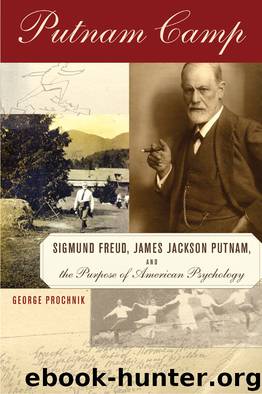Putnam Camp by George Prochnik

Author:George Prochnik [Prochnik, George]
Language: eng
Format: epub
ISBN: 978-1-59051-621-8
Publisher: Other Press
Published: 2012-12-03T16:00:00+00:00
IT’S DIFFICULT TO tell when, in their five years of working together, Putnam and Marian’s shared engagement in philanthropic activism ripened into love. The process might have been almost too smooth to register. As Emerson wrote in “Fate,” “Wonderful intricacy in the web, wonderful constancy in the design this vagabond life admits. We wonder how the fly finds its mate, and yet year after year, we find two men, two women, without legal or carnal tie, spend a great part of their best time within a few feet of each other. And the moral is that what we seek we shall find.” Thus, one day, after an especially tender discussion about some inspiring charity case such as the boy Joe Scarlatti who, when taken by a friendly visitor into the Museum of Fine Arts, begged only for “More George Washingtons,” Jim took Marian’s hands and proposed marriage. Whenever it crystallized, however, Putnam’s marriage was not just a surrender to the predominant model of local femininity, as I’d imagined before reading the courtship letters; it was also an act of commitment to the most visible form of idealism then being enacted in Boston.
Marian’s own branch of the work was focused on the socialization of the poor. In several long essays written for the Associated Charities in the years immediately before and after her marriage, Marian expounded on the concept of “Friendly Visiting,” sometimes also known as “Volunteer Visiting.” Though the practice originated in England, it was given an American imprimatur in Boston, where Marian’s version was an especially influential example of the model.
In her most important paper, written in the mid-1890s, she defined the Associated Charities’ motto as signifying “that in the good offices and influence, the love and loyalty which we see exemplified in a true friendship, lies the power upon which we build our hope of helping others.” Marian noted that the concept of “Friendly Visiting” is in fact “as old as human society itself.” Her own definition of the term took the code of social manners she’d been raised on, grounded in the obligation to pay frequent regular calls on the network of one’s social relationships, and applied that model to the challenge of charitable service. “ ‘Friendly Visiting,’ ” she wrote, “meant seeing and knowing the people, whom we wish to help, in their own homes, and after we know them, taking hold with them to help them conquer their difficulties.” One was to drop in, hear what the poor had to say over a cup of tea, commiserate, and make suggestions from one’s own fund of knowledge as to what could be done to improve their lives.
By its nature, this was a politically static paradigm of reform. “The object of a visitor should be, first of all, to try to make the family better and happier where they are and with the resources they have. We come to realize after a time that the majority of poor families in a city must continue to live without any very striking change of circumstances.
Download
This site does not store any files on its server. We only index and link to content provided by other sites. Please contact the content providers to delete copyright contents if any and email us, we'll remove relevant links or contents immediately.
Rewire Your Anxious Brain by Catherine M. Pittman(17589)
Talking to Strangers by Malcolm Gladwell(11876)
The Art of Thinking Clearly by Rolf Dobelli(8841)
Mindhunter: Inside the FBI's Elite Serial Crime Unit by John E. Douglas & Mark Olshaker(7833)
Becoming Supernatural by Dr. Joe Dispenza(7105)
Change Your Questions, Change Your Life by Marilee Adams(6641)
Nudge - Improving Decisions about Health, Wealth, and Happiness by Thaler Sunstein(6633)
The Road Less Traveled by M. Scott Peck(6633)
The Lost Art of Listening by Michael P. Nichols(6472)
Enlightenment Now: The Case for Reason, Science, Humanism, and Progress by Steven Pinker(6405)
Win Bigly by Scott Adams(6311)
Mastermind: How to Think Like Sherlock Holmes by Maria Konnikova(6234)
The Way of Zen by Alan W. Watts(5798)
Daring Greatly by Brene Brown(5639)
Grit by Angela Duckworth(4735)
Big Magic: Creative Living Beyond Fear by Elizabeth Gilbert(4723)
Men In Love by Nancy Friday(4320)
Flow by Mihaly Csikszentmihalyi(4052)
The Four Tendencies by Gretchen Rubin(4024)
